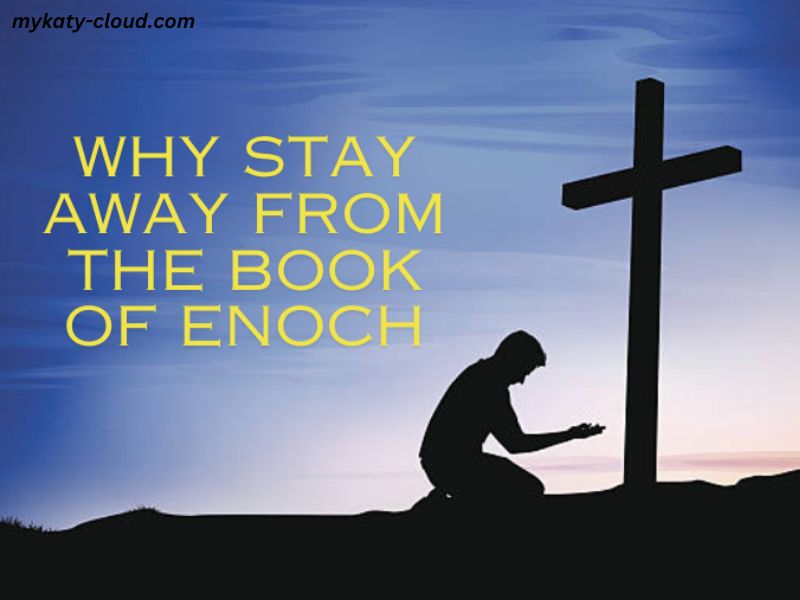The Stay away From the Book of Enoch, often referred to as 1 Enoch, is an ancient Jewish text that is widely regarded for its influence on early Christian and Jewish mysticism. It presents itself as the revelations of the great patriarch Enoch, the great-grandfather of Noah, a figure in the Bible. It contains visions, prophecies, and complex accounts of heavenly journeys, angels, and divine judgment. The Book of Enoch is considered apocryphal, meaning it is not included in the canonical scriptures of most religious traditions, and there are strong reasons why many scholars and theologians advise against reading it, or at least approaching it with extreme caution.
In this article, we will explore why many advise staying away from the Stay away From the Book of Enoch, from its dubious origins to its controversial content and the theological issues it raises.
The Stay away From the Book of Enoch Dubious Origins
The origins of the Stay away From the Book of Enoch are shrouded in mystery and uncertainty. It is generally believed to have been written between the 3rd century BCE and the 1st century CE, with multiple layers of authorship and influence. The text exists in several versions, the most notable being the Ethiopian manuscript, which survived in full, and the Greek and Aramaic fragments, which contain only parts of the original work. However, the lack of concrete evidence for its authenticity and the absence of historical confirmation regarding its authorship raise significant questions about its reliability.
The Stay away From the Book of Enoch is not considered canonical by most Jewish or Christian traditions. In Judaism, the text was excluded from the Hebrew Bible, and in Christianity, it was omitted from the New Testament, despite being referenced by early Church fathers. This exclusion was due to its unclear provenance, as well as its potential for heretical or unorthodox teachings. The fact that it has remained outside the core scriptures of these two influential religious traditions suggests that its teachings were not considered authoritative or suitable for inclusion in the religious canon.
Its Association with Unorthodox Beliefs
The Stay away From the Book of Enoch contains several concepts and teachings that are outside the mainstream of both Jewish and Christian Technology . One of the central themes in the text is the narrative of the fallen angels, known as the Watchers, who descend to earth and engage in relations with human women. The offspring of these unions are described as giants, often referred to as the Nephilim. These stories have a strong supernatural and mythological component, and their inclusion in the Book of Enoch has led some to classify it as a work of mysticism and folklore rather than solid theological doctrine.
In addition, the Book of Enoch provides a highly detailed cosmology, including the depiction of an elaborate celestial hierarchy. Angels are assigned various roles, and there are even specific angels responsible for guiding and punishing the fallen ones. This complex angelology is not only foreign to traditional Jewish and Christian beliefs but has been used by some to support esoteric or occult practices. The level of detail in this cosmology and the vivid descriptions of otherworldly realms can serve as an enticing but ultimately misleading framework for those seeking spiritual enlightenment outside the bounds of traditional religious teachings.
Theological and Doctrinal Issues
One of the primary reasons many theologians caution against the Stay away From the Book of Enoch is the significant theological issues it raises. The most troubling aspect for many is its portrayal of divine judgment. The text often presents God’s judgment as being imposed through violent and catastrophic means. While judgment is an integral part of Christian and Jewish theology, the Book of Enoch’s dramatic depictions of the destruction of the wicked can easily lead readers to misinterpret the nature of God’s justice. This extreme portrayal of divine wrath may conflict with more established teachings on the mercy, grace, and long-suffering nature of God found in the canonical Bible.
Furthermore, the Book of Enoch contains several teachings that contradict core Christian doctrines, such as the nature of sin, salvation, and the role of Jesus Christ. For example, some scholars believe that the Stay away From the Book of Enoch presents a kind of “salvific angelology,” in which salvation is mediated through angelic intermediaries rather than directly through faith in God or Christ. This directly contradicts the New Testament teachings on the role of Jesus as the sole mediator between humanity and God, as well as the foundational Christian doctrine of salvation through Christ alone.
The Danger of Esotericism
A significant issue with the Stay away From the Book of Enoch is its frequent use in esoteric and occult circles. Its themes of hidden knowledge, angelic beings, and secret teachings have made it a favorite among those who seek secret or forbidden wisdom. Throughout history, some occult groups have drawn upon the Book of Enoch’s imagery and content, interpreting it as a source of hidden truth or mystical enlightenment. This has led to its association with Gnosticism, the belief that salvation comes through the acquisition of secret, mystical knowledge, and other unorthodox spiritual movements.
For individuals who are seeking spiritual growth, the allure of hidden wisdom or secret teachings can be dangerous. It can lead people away from sound, orthodox religious beliefs and toward a path of spiritual deception. The temptation to interpret the Stay away From the Book of Enoch as a source of deeper, hidden knowledge can be a perilous journey, especially if it encourages a person to reject the clear and revealed truths found in the canonical scriptures.
The Focus on Angels and Supernatural Entities
Another reason to exercise caution when reading the Stay away From the Book of Enoch is its intense focus on angels, which can overshadow more important aspects of faith. In the Book of Enoch, angels are depicted in extraordinary detail, with specific names, duties, and characteristics. These celestial beings play a central role in the narrative, and much of the text is dedicated to their actions, fall, and judgment.
While the Bible acknowledges the existence of angels, the Book of Enoch places an inordinate amount of attention on these beings, often elevating them to a near-deity status. This excessive focus on angels can detract from the primary message of both Judaism and Christianity—the worship of God alone. The New Testament, in particular, warns against the worship or veneration of angels (Colossians 2:18), which could be an unintended outcome of engaging too deeply with the angel-centric teachings of the Book of Enoch.
Historical and Cultural Distortion
The Stay away From the Book of Enoch reflects a particular time and place in history, but its teachings can distort the broader, more universal messages found in the Bible. Its historical context—the late Second Temple period of Judaism—means that many of its ideas were shaped by the cultural and religious beliefs of the time, including apocalyptic and messianic thought. While some of the Book of Enoch’s ideas were influential in early Christian theology, they were ultimately rejected in favor of the teachings that were deemed more faithful to the Old Testament scriptures.
By reading the Book of Enoch without considering its historical and theological context, readers may risk adopting views that are inconsistent with the broader biblical narrative. For instance, certain apocalyptic themes in the Book of Enoch have been misinterpreted by some as predictive of future events, leading to the rise of various doomsday cults and esoteric movements.
Conclusion
The Stay away From the Book of Enoch is a fascinating and complex work that offers a window into ancient Jewish thought and apocalyptic literature. However, its content raises several theological, historical, and spiritual concerns that make it highly problematic for many people of faith. Its unorthodox teachings, supernatural focus, and association with esoteric practices have led many religious scholars and theologians to caution against reading it, or at the very least, to approach it with extreme caution.
For those who seek a deeper understanding of God’s will, it is important to stay rooted in the canonical scriptures, which have been vetted and recognized by religious communities for centuries. The Bible offers clear, authoritative teachings that guide believers in faith, ethics, and salvation. While the Stay away From the Book of Enoch may be intriguing from a historical or literary perspective, it is not a trustworthy or suitable source for spiritual guidance. Instead, individuals should focus on the revealed truths found in the Bible, allowing these scriptures to provide a firm foundation for their faith.




